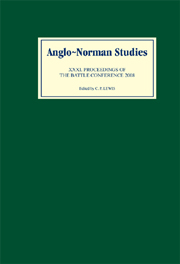Book contents
- Frontmatter
- Contents
- LIST OF ILLUSTRATIONS, MAPS, AND TABLES
- EDITOR'S PREFACE
- ABBREVIATIONS
- Kingship, Lordship, and Community in Eleventh-Century England (R. Allen Brown Memorial Lecture)
- Citadels of God: Monasteries, Violence, and the Struggle for Power in Northern England, 1135–1154
- Writing Civil War in Henry of Huntingdon's Historia Anglorum
- Land, Family, and Depredation: The Case of St Benet of Holme's Manor of Little Melton
- Brothers at Court: Urse de Abetot and Robert Dispenser
- Gerald of Wales and the Prophet Merlin
- The First Hundred Years of the Abbey of Tiron: Institutionalizing the Reform of the Forest Hermits
- All Roads Lead to Chartres: The House of Blois, the Papacy, and the Anglo-Norman Succession of 1135
- The Vita Ædwardi: The Politics of Poetry at Wilton Abbey
- William of Malmesbury, King Henry I, and the Gesta Regum Anglorum
- Twelfth-Century Receptions of a Text: Anglo-Norman Historians and Hegesippus
- LIST OF CONTENTS OF VOLUMES 1–30
Gerald of Wales and the Prophet Merlin
Published online by Cambridge University Press: 12 September 2012
- Frontmatter
- Contents
- LIST OF ILLUSTRATIONS, MAPS, AND TABLES
- EDITOR'S PREFACE
- ABBREVIATIONS
- Kingship, Lordship, and Community in Eleventh-Century England (R. Allen Brown Memorial Lecture)
- Citadels of God: Monasteries, Violence, and the Struggle for Power in Northern England, 1135–1154
- Writing Civil War in Henry of Huntingdon's Historia Anglorum
- Land, Family, and Depredation: The Case of St Benet of Holme's Manor of Little Melton
- Brothers at Court: Urse de Abetot and Robert Dispenser
- Gerald of Wales and the Prophet Merlin
- The First Hundred Years of the Abbey of Tiron: Institutionalizing the Reform of the Forest Hermits
- All Roads Lead to Chartres: The House of Blois, the Papacy, and the Anglo-Norman Succession of 1135
- The Vita Ædwardi: The Politics of Poetry at Wilton Abbey
- William of Malmesbury, King Henry I, and the Gesta Regum Anglorum
- Twelfth-Century Receptions of a Text: Anglo-Norman Historians and Hegesippus
- LIST OF CONTENTS OF VOLUMES 1–30
Summary
My subject is the remarkable role of the prophet Merlin in English politics from Henry II through to King John, as evidenced by the writer who outlived them both, Gerald of Wales. Gerald was born in 1146, just a few years after the publication of Geoffrey of Monmouth's History of the Kings of Britain; he died in 1223, after a long retirement from a busy but ultimately disappointing life: he had been a student and master in Paris, a courtier and diplomat in the service of Henry II and his successor Richard, an archdeacon of Brecon, but his dream of becoming a distinguished bishop had come to nothing. Despite all his business, he was an extremely prolific writer. Below is an approximate chronology of Gerald's works that are relevant to my argument (he in fact wrote much more).
Topographia Hibernica (The Topography of Ireland). 1st recension 1187, dedicated to Henry II; 2nd recension 1189; 3rd recension early thirteenth century.
Vaticinalis historia (The Prophetic History). There are two recensions: version α, 1189, dedicated to Count Richard; and version β, pre-dating 1218, entitled Expugnatio Hibernica (The Conquest of Ireland).
Itinerarium Kambriae (The Journey through Wales). 1st edition 1191; 2nd edition 1197; 3rd edition 1214.
Gemma ecclesiastica (The Jewel of the Church). 1197.
De invectionibus. Begun 1200, completed 1216.
De principis instructione. Book I, a Mirror for Princes, published 1192; books II-III, a scathing account of the Plantagenet kings, not released until 1217.
- Type
- Chapter
- Information
- Anglo-Norman Studies 31Proceedings of the Battle Conference 2008, pp. 90 - 103Publisher: Boydell & BrewerPrint publication year: 2009



